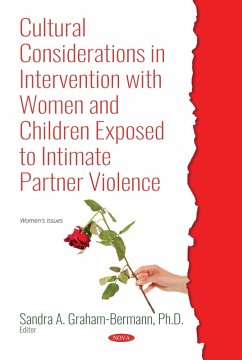Intimate partner violence (IPV) is a common and tragic event in the lives of women and children around the world. Estimates of lifetime occurrence range from 5% in Japan to 71% in Ethiopia, with at least 25% in the United States. The United Nations Secretary-General indicates that as many as 275 million children worldwide are exposed to violence in their homes every year. In addition to the financial and societal costs, women and children who experience IPV are at risk for developing physical injuries, heath problems, depression, anxiety, traumatic stress, and associated work and academic problems. Yet few countries offer services that have been proven to be effective in supporting these women and children. In this volume, two programs are described that have been found to be effective in reducing negative consequences and promoting resilience for diverse groups of women and children in North America. The subsequent chapters address what it would take to implement these or other such programs in countries around the world, including Sweden, Ukraine, Rwanda, Honduras, Peru and Pakistan. The authors are scholars in social work and psychology who work with women and children exposed to intimate partner violence and who are involved in researching issues related to the effects of IPV on women and children. Clearly, IPV is a global public health issue and this thought-provoking volume suggests ways to address it using culturally appropriate adaptations.
Dieser Download kann aus rechtlichen Gründen nur mit Rechnungsadresse in A, B, BG, CY, CZ, D, DK, EW, E, FIN, F, GR, HR, H, IRL, I, LT, L, LR, M, NL, PL, P, R, S, SLO, SK ausgeliefert werden.









